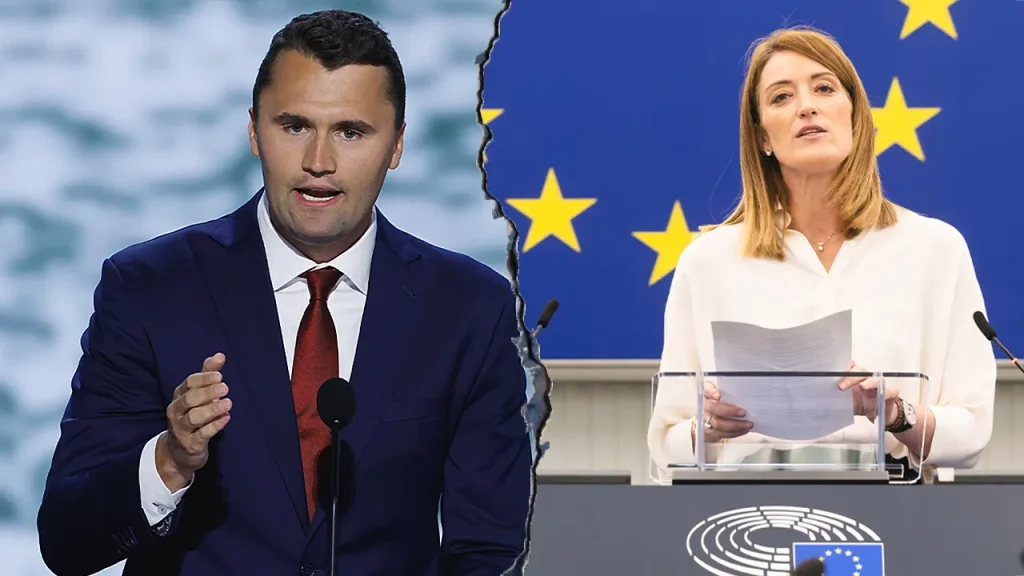European Parliament Denies Moment of Silence for Charlie Kirk: A Divided Response
In a tense moment highlighting deep political divisions, the European Parliament rejected a request to honor Charlie Kirk with a moment of silence on Thursday. Kirk, the 31-year-old founder of Turning Point USA, was tragically killed the previous day while speaking to students at Utah Valley University. The shocking assassination of a prominent conservative voice sent ripples through both American and European political landscapes, with reactions falling sharply along ideological lines.
The request for the tribute came from Swedish MEP Charlie Weimers of the European Conservatives and Reformists group, who asked his colleagues to pause proceedings to “declare that our right to freedom of speech cannot be extinguished.” His proposal received support from right-wing parties, including Germany’s AfD and France’s Identity Liberties movement. However, European Parliament President Roberta Metsola denied the request, citing procedural rules that require formal tribute submissions at the opening of a plenary session. She explained that since Monday’s opening had already passed, a tribute could still be scheduled for October. When Weimers attempted to use his remaining speaking time for an impromptu moment of silence, Vice President Katarina Barley intervened, cutting him off and prompting desk-banging protests from right-wing lawmakers while centrist and left-leaning members applauded the decision.
The parliamentary divide mirrored the broader political reactions to Kirk’s death. In the United States, President Donald Trump described Kirk as “the best of America,” while Italian Prime Minister Giorgia Meloni called the attack “a deep wound for democracy.” Outside the parliamentary chamber, Hungarian Fidesz MEP András László accused Parliament of hypocrisy, pointing out that it had previously honored George Floyd but refused to do the same for Kirk. Some lawmakers took to social media, posting “I am Charlie” images reminiscent of the solidarity shown after the 2015 Charlie Hebdo attack in Paris. These divergent responses highlight how even in tragedy, political polarization shapes public mourning.
Metsola defended the Parliament’s decision as consistent with established procedures while still offering condolences: “Our thoughts and prayers are with his wife and young children — who were the bedrock of his life.” The incident raises questions about when and how public institutions choose to honor controversial figures after tragic events. Kirk had built his career on mobilizing young conservatives through campus appearances and social media, becoming both a celebrated figure on the right and a controversial one to those who opposed his views. His death during a campus event has heightened concerns about political violence in the increasingly polarized American landscape.
The parliamentary refusal to hold an immediate moment of silence illustrates the complex relationship between procedural norms and political expression in democratic institutions. While some viewed the decision as a reasonable adherence to parliamentary rules, others interpreted it as a politically motivated slight against a conservative figure. This tension reflects broader debates about free speech, political violence, and the uneven application of institutional norms across the political spectrum. The incident also demonstrates how European political bodies increasingly reflect and respond to American political developments, with European lawmakers taking clear stances on U.S. political figures and events.
As the manhunt for Kirk’s assassin continues in the United States, the European Parliament’s response serves as a reminder of how deeply intertwined global politics have become. What happens on a university campus in Utah can spark immediate parliamentary debate in Strasbourg. The controversy over the moment of silence is likely to become another flashpoint in ongoing culture wars, with each side seeing in it a confirmation of their existing worldview: the right viewing institutional bias against conservative causes, and the left defending procedural norms against what they see as political opportunism. Meanwhile, Kirk’s family mourns a husband and father, a human tragedy that transcends the political divisions his life and death have come to symbolize.


